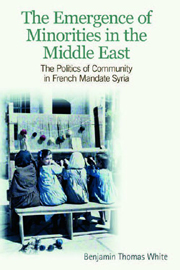Book contents
- Frontmatter
- Contents
- Map 1. Syria c.1936
- Map 2. The Far Northeast of Syria in the 1930s
- Outline Chronology of the French Mandate, 1919–39
- Acknowledgements
- Introduction
- Part I
- Part II
- Part III
- 5 The Franco-Syrian Treaty and the Definition of ‘Minorities’
- 6 Personal Status Law Reform
- Conclusion: Minorities, Majorities and the Writing of History
- Select Bibliography
- Index
5 - The Franco-Syrian Treaty and the Definition of ‘Minorities’
from Part III
Published online by Cambridge University Press: 12 September 2012
- Frontmatter
- Contents
- Map 1. Syria c.1936
- Map 2. The Far Northeast of Syria in the 1930s
- Outline Chronology of the French Mandate, 1919–39
- Acknowledgements
- Introduction
- Part I
- Part II
- Part III
- 5 The Franco-Syrian Treaty and the Definition of ‘Minorities’
- 6 Personal Status Law Reform
- Conclusion: Minorities, Majorities and the Writing of History
- Select Bibliography
- Index
Summary
Introduction
Ignace Nouri thought that the meaning of ‘minority’ was self-evident when he wrote to the High Commissioner in 1936 about treaty guarantees for ‘the minorities, that is to say the Christians and Jews’. A few years earlier, the Aleppo deputy Latif Ghanimé – like Nouri, a Syrian-Catholic – took a different view. He told the French intelligence services that the Syrian parliament would be more likely to ratify a treaty containing minority guarantees if they applied to ethnic minorities as well as religious ones: this would make it possible to ‘range among the minoritarians the Kurdish deputies of the North and the Djézireh, the Tcherkess deputy of Kuneitra, even Soubhi Bey Barakat and the deputies of the Sanjak of Alexandretta as representatives of the “Turks”’. His own patriarchate apparently disagreed. Ethnolinguistic minorities, meanwhile, were not only defined from the outside: ‘the Tcherkess of Syria’, said a petition signed by Circassians from several parts of the country, ‘have always claimed their national minority rights as a community having its own race, language and traditions different from those of the Syrian majority’.
So who was a minority? The answer was evidently open to dispute. But there is another question, just as important but perhaps less obvious: why, around 1930, did all of these people start calling themselves – or others – ‘minorities’? At the outset of the mandate, few people thought that Syria had ‘minorities’; by the 1930s, as French observers seriously entertained the possibility of Syrian independence (of a sort), they were commonly using the term – and Syrians were too.
- Type
- Chapter
- Information
- The Emergence of Minorities in the Middle EastThe Politics of Community in French Mandate Syria, pp. 131 - 161Publisher: Edinburgh University PressPrint publication year: 2011



